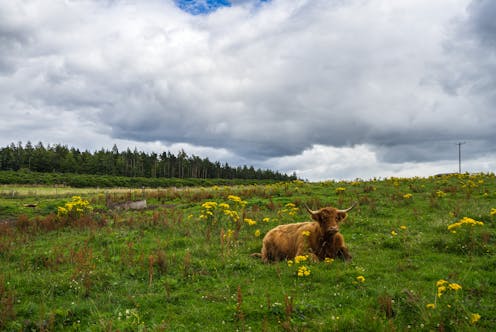Changes to farmers’ inheritance tax are fair and could even help them in the long run – expert view
- Written by Stuart MacLennan, Associate Professor of Law, Coventry University

Much has been made of proposed changes to inheritance tax[1] for agricultural property in the recent UK budget. Opponents have focused on the number of farms that might be affected, while the government’s arguments focus on the need to raise revenue. There are, however, good reasons to reform a tax break known as agricultural property relief (APR) which may, ultimately, benefit farming communities and the rural economy.
It’s helpful to take a longer view of inheritance tax than other taxes. While most people pay VAT every day, and income tax every month, we only ever pay inheritance tax once, and not even in our own lifetimes. Assets passed down through families might only be subject to inheritance tax every 25–30 years, and the way it’s levied is likely to have changed from generation to generation.
The estate duty[2] that existed for much of the 20th century for the most part provided limited relief for agricultural property. Estate duty was replaced by capital transfer tax[3] in 1975, with marginal tax rates (the rate paid on the highest-value part of the estate) as high as 75%. This was accompanied, however, by a fairly generous relief for agricultural property, conditional upon the inheritor carrying on farming as a trade.
The present form of inheritance tax developed in the mid-1980s, and 100% APR – the removal of which is at the centre of the current protests – was introduced in the 1992 budget[4].
What this all means is that agricultural property that has been passed down from generation to generation is unlikely to have done so tax-free in perpetuity. Instead, it is far more likely that these farms will have been passed down subject to a variety of regimes offering different levels of relief.
APR does not apply to the full open market value of agricultural property – only the “agricultural value” of this land may be deducted from an estate’s worth. Agricultural value is the value of the land assuming it may never be used for anything but farming. The Lands Tribunal[5] previously ruled that this may take its worth down to 30% below market value[6] – and that was long before the explosion in market values we have seen in recent years.
Why is this significant? As agricultural value is almost always lower (in many cases significantly lower) than open market value, that means agricultural property ends up being subject to inheritance tax on the difference between the market value and the agricultural value. The more that difference grows, the more inheritance tax farmers will end up paying, whether or not APR applies.
There is ample evidence[7] to suggest that this is already occurring thanks to well-known tax avoidance schemes.
A basic tenet of tax design is “horizontal equity” – the idea that two taxpayers in similar situations should pay similar levels of tax. Not only is this regarded as fundamental to the fairness of the system, it also minimises opportunities for tax avoidance. The availability of unlimited agricultural property relief, however, creates a significant opportunities for tax avoidance, which are well known and well marketed. This can have a significant impact on the price of agricultural land and who owns it.
Open market values for agricultural property are skyrocketing[8]. Usually, the value of business assets is linked solely to returns on investment, so either farming has suddenly become massively more profitable, or else something else is driving up that value.
Estate agents Strutt and Parker report[9] that non-farmers bought the majority of farms and estates in 2023, and pay a significant premium[10] when compared to farmers – in part because they tend to prefer the most scenic areas.
While inheritance tax changes are unlikely to cause a significant fall in prices per acre, restricting APR should help to keep a cap on the premium prices and keep open market values closer to agricultural values. This should make it more affordable for genuine farmers to expand their businesses if they want to.
I come from an agricultural community in the Scottish Highlands. Farming is a significant part of the local economy, but it is not the only part. Every farm is in a relationship of mutual dependence with other local businesses: agricultural supply companies, tractor and machinery maintenance firms, veterinary practices, and processing businesses such as abattoirs. And then there are the solicitors and accountants who support businesses more broadly.
Why should farms benefit from 100% APR, but similarly capital-intensive abattoirs and processing plants used by these farms only benefit from 50% relief? The principle of horizontal equity dictates that they should not.
Land ownership in the UK remains highly concentrated[12]. The exploitation of APR for tax avoidance serves to increase that concentration. The historical reputation of absentee landlords[13] is not, generally, a positive one.
Every tax change inevitably creates winners and losers, especially in the short term. But the long-term impact of this move will likely include a significant reduction in the use of agricultural property for large-scale tax avoidance, a closer relationship between the agricultural and market values of land, and greater diversity of land ownership.
Keeping a lid on the exploitation of agricultural property for tax avoidance purposes should, ultimately, ensure that farmland is primarily bought and sold for use by farmers. This, in turn, provides greater benefit to the rural economy.
References
- ^ changes to inheritance tax (theconversation.com)
- ^ estate duty (uk.practicallaw.thomsonreuters.com)
- ^ capital transfer tax (uk.practicallaw.thomsonreuters.com)
- ^ 1992 budget (www.theguardian.com)
- ^ The Lands Tribunal (www.gov.uk)
- ^ 30% below market value (www.gov.uk)
- ^ evidence (rural.struttandparker.com)
- ^ skyrocketing (rural.struttandparker.com)
- ^ Strutt and Parker report (rural.struttandparker.com)
- ^ significant premium (www.struttandparker.com)
- ^ Caftor/Shutterstock (www.shutterstock.com)
- ^ remains highly concentrated (whoownsengland.org)
- ^ absentee landlords (theconversation.com)







